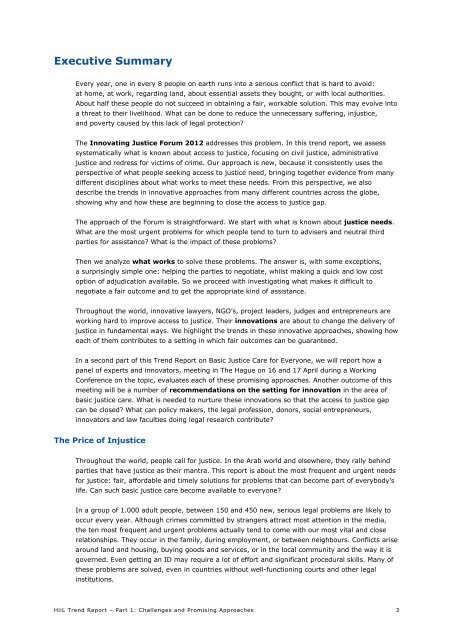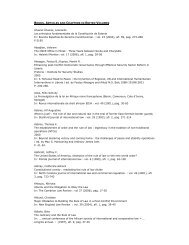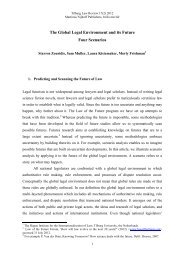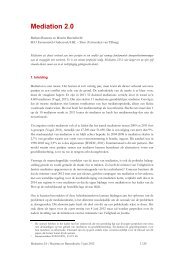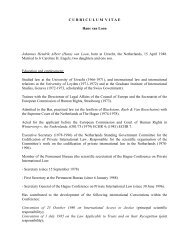Trend Report | Part 1 - HiiL
Trend Report | Part 1 - HiiL
Trend Report | Part 1 - HiiL
You also want an ePaper? Increase the reach of your titles
YUMPU automatically turns print PDFs into web optimized ePapers that Google loves.
Executive Summary<br />
Every year, one in every 8 people on earth runs into a serious conflict that is hard to avoid:<br />
at home, at work, regarding land, about essential assets they bought, or with local authorities.<br />
About half these people do not succeed in obtaining a fair, workable solution. This may evolve into<br />
a threat to their livelihood. What can be done to reduce the unnecessary suffering, injustice,<br />
and poverty caused by this lack of legal protection?<br />
The Innovating Justice Forum 2012 addresses this problem. In this trend report, we assess<br />
systematically what is known about access to justice, focusing on civil justice, administrative<br />
justice and redress for victims of crime. Our approach is new, because it consistently uses the<br />
perspective of what people seeking access to justice need, bringing together evidence from many<br />
different disciplines about what works to meet these needs. From this perspective, we also<br />
describe the trends in innovative approaches from many different countries across the globe,<br />
showing why and how these are beginning to close the access to justice gap.<br />
The approach of the Forum is straightforward. We start with what is known about justice needs.<br />
What are the most urgent problems for which people tend to turn to advisers and neutral third<br />
parties for assistance? What is the impact of these problems?<br />
Then we analyze what works to solve these problems. The answer is, with some exceptions,<br />
a surprisingly simple one: helping the parties to negotiate, whilst making a quick and low cost<br />
option of adjudication available. So we proceed with investigating what makes it difficult to<br />
negotiate a fair outcome and to get the appropriate kind of assistance.<br />
Throughout the world, innovative lawyers, NGO’s, project leaders, judges and entrepreneurs are<br />
working hard to improve access to justice. Their innovations are about to change the delivery of<br />
justice in fundamental ways. We highlight the trends in these innovative approaches, showing how<br />
each of them contributes to a setting in which fair outcomes can be guaranteed.<br />
In a second part of this <strong>Trend</strong> <strong>Report</strong> on Basic Justice Care for Everyone, we will report how a<br />
panel of experts and innovators, meeting in The Hague on 16 and 17 April during a Working<br />
Conference on the topic, evaluates each of these promising approaches. Another outcome of this<br />
meeting will be a number of recommendations on the setting for innovation in the area of<br />
basic justice care. What is needed to nurture these innovations so that the access to justice gap<br />
can be closed? What can policy makers, the legal profession, donors, social entrepreneurs,<br />
innovators and law faculties doing legal research contribute?<br />
The Price of Injustice<br />
Throughout the world, people call for justice. In the Arab world and elsewhere, they rally behind<br />
parties that have justice as their mantra. This report is about the most frequent and urgent needs<br />
for justice: fair, affordable and timely solutions for problems that can become part of everybody’s<br />
life. Can such basic justice care become available to everyone?<br />
In a group of 1.000 adult people, between 150 and 450 new, serious legal problems are likely to<br />
occur every year. Although crimes committed by strangers attract most attention in the media,<br />
the ten most frequent and urgent problems actually tend to come with our most vital and close<br />
relationships. They occur in the family, during employment, or between neighbours. Conflicts arise<br />
around land and housing, buying goods and services, or in the local community and the way it is<br />
governed. Even getting an ID may require a lot of effort and significant procedural skills. Many of<br />
these problems are solved, even in countries without well-functioning courts and other legal<br />
institutions.<br />
<strong>HiiL</strong> <strong>Trend</strong> <strong>Report</strong> – <strong>Part</strong> 1: Challenges and Promising Approaches 3


